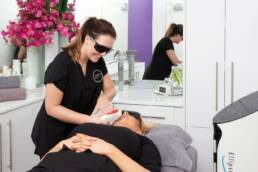Everything you need to know about
Polynucleotides
Polynucleotides are creating quite a buzz in the world of aesthetics and skincare. If you’re curious about what they are, how they work, and why they’re being hailed as a game-changer, you’re in the right place. Let’s dive into the fascinating world of polynucleotides and explore their benefits in skin rejuvenation.
What Are Polynucleotides?
Polynucleotides (PNs) are naturally occurring molecules derived from DNA. These chains of nucleotides—the building blocks of DNA and RNA—play a crucial role in cellular repair and regeneration.
- Natural Origin: Most polynucleotides used in skincare are extracted from fish DNA due to their compatibility with human biology.
- Biocompatible: Because they’re naturally occurring, polynucleotides integrate seamlessly into the skin, minimizing the risk of adverse reactions.
How Do Polynucleotides Work?
- Polynucleotides are introduced into the skin via injections, where they get to work rejuvenating and repairing at a cellular level.Here’s how they function:
- Stimulate Collagen Production: They encourage fibroblasts (collagen-producing cells) to ramp up collagen synthesis.
- Enhanced Tissue Repair: Polynucleotides promote cell turnover, repairing damaged skin and improving elasticity.
- Hydration Boost: They attract water molecules, leading to deep skin hydration.
- Anti-Inflammatory Effects: PNs help soothe inflamed skin, making them suitable for conditions like rosacea.
The Benefits of Polynucleotides for Skin
Why are polynucleotides becoming a must-have treatment? Let’s break down their benefits:
- Improved Skin Elasticity: Say goodbye to sagging and hello to firmer, plumper skin.
- Reduced Fine Lines and Wrinkles: With increased collagen, the appearance of wrinkles diminishes over time.
- Brighter, Even Skin Tone: Polynucleotides can help reduce pigmentation, giving you a radiant complexion.
- Hydrated, Dewy Skin: The hydrophilic nature of PNs means your skin stays moisturized from within.
- Healing and Recovery: Perfect for sensitive or post-procedure skin, thanks to their reparative properties.
Who Can Benefit from Polynucleotide Treatments?
Polynucleotide therapy is versatile and can address various skin concerns, including:
- Aging skin (loss of volume, fine lines, and wrinkles)
- Dehydration and dullness
- Acne scars or other types of skin damage
- Skin laxity (especially in areas like the neck and décolletage)
- Sensitive, irritated, or inflamed skin
The Treatment Process
Curious about what to expect during a polynucleotide treatment? Here’s a quick overview:
- Consultation: Your practitioner will assess your skin and determine if polynucleotides are the right choice.
- Application: A numbing cream may be applied to reduce discomfort, and polynucleotides are injected into targeted areas.
- Post-Treatment Care: You’ll receive aftercare instructions, such as avoiding intense heat and makeup for a short time.
- Results: Expect to see gradual improvement in skin texture, elasticity, and hydration over the following weeks.
FAQs About Polynucleotides
1. Are polynucleotides safe?
Yes, they are highly biocompatible, with minimal risk of side effects when administered by a trained professional.
2. How many sessions will I need?
Typically, 2–3 sessions are recommended for optimal results, spaced a few weeks apart.
3. Is there downtime?
There may be mild redness or swelling immediately after the treatment, but this usually subsides within a day or two.
Why Choose Polynucleotide Therapy?
If you’re looking for a minimally invasive treatment that delivers lasting results, polynucleotides could be the solution. With their ability to repair, hydrate, and rejuvenate the skin, they’re quickly becoming a staple in the world of aesthetics.
Ready to experience the magic of polynucleotides? Contact your aesthetic clinic to learn more and book your consultation today!
Polynucleotides are proof that science and beauty go hand in hand, offering innovative ways to achieve healthier, more youthful skin.

Dr Julie, Clinical Aesthetics
Book a consultation with Dr Julie to feel good in your skin.
“This article was originally published on Dr Julie’s website“




